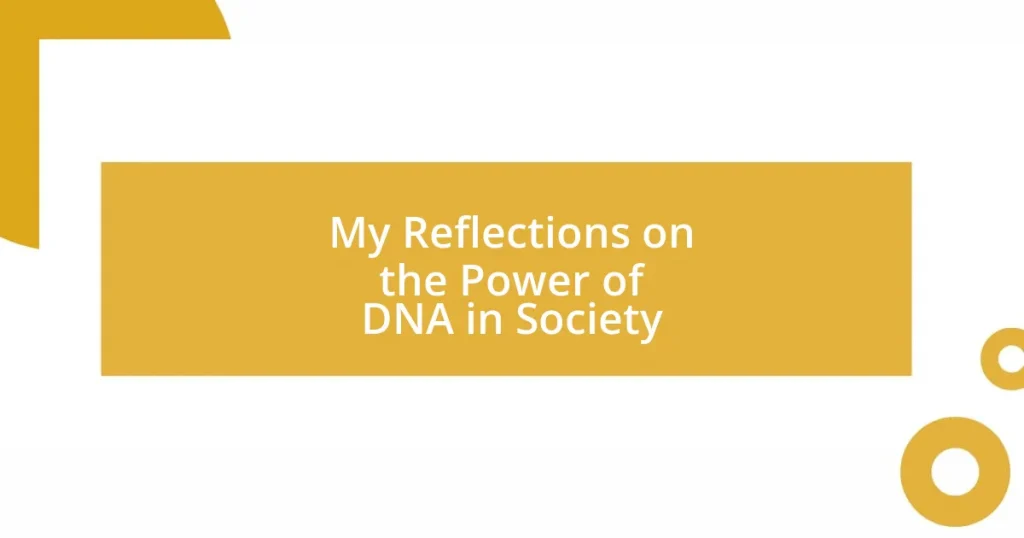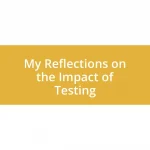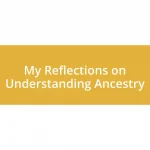Key takeaways:
- Discovery of DNA double helix by Watson and Crick in 1953 revolutionized genetics and medicine.
- Completion of the Human Genome Project in 2003 provided insights for personalized medicine and health decision-making.
- Ethical concerns include genetic privacy, informed consent, and the potential for misuse by employers or insurers.
- Advancements like CRISPR gene editing pose both opportunities for eradicating diseases and ethical dilemmas regarding human modification.
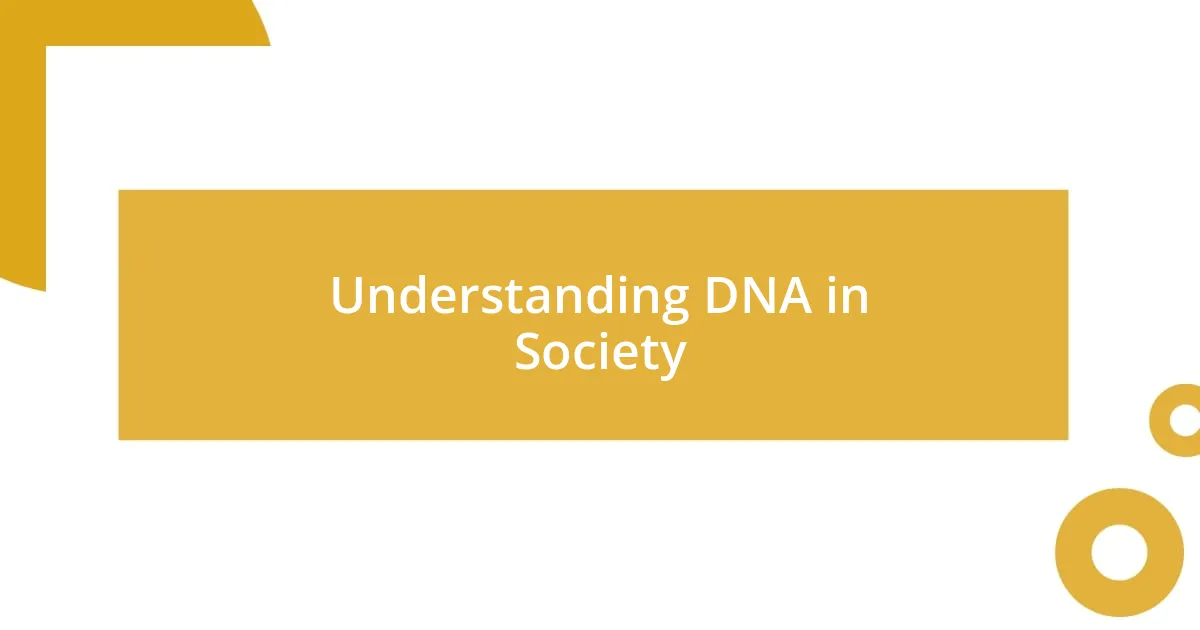
Understanding DNA in Society
DNA serves as the blueprint of life, intricately linking every living organism. It’s fascinating to consider how our genetic makeup shapes not just our physical traits but also influences aspects of our health and personality. Have you ever wondered how the puzzle of our DNA is pieced together, revealing connections with those we may never meet?
In my own experience, learning about DNA’s role in ancestry opened my eyes to a world of connections. When I took a DNA test to explore my heritage, I discovered distant relatives and unexpected cultural backgrounds. This journey made me reflect on how our genetic connections create a tapestry of shared experiences and histories, transcending borders.
Moreover, the ethical implications of DNA use in society are compelling. As we navigate through advancements in genetic testing and modification, I often find myself pondering how these technologies can both empower us and raise daunting questions about privacy and consent. What responsibility do we hold in ensuring that our genetic information is used ethically? It’s a conversation worth having, as our understanding of DNA continues to evolve in profound ways.
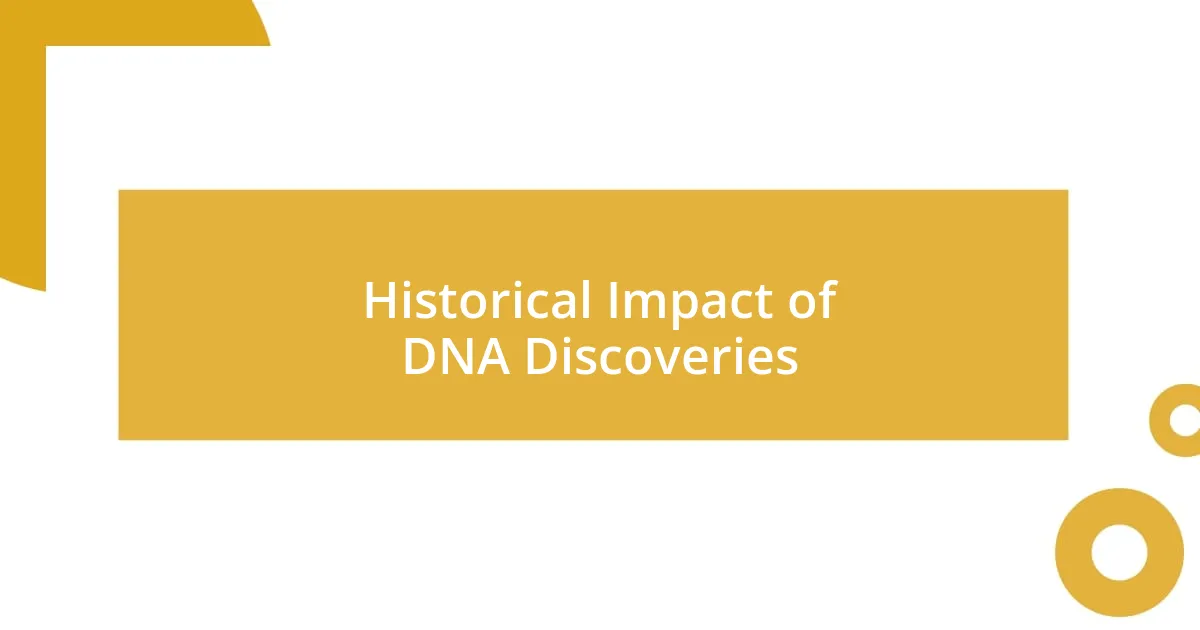
Historical Impact of DNA Discoveries
It’s remarkable to look back at the milestones in DNA research and how they have shaped society. The discovery of the double helix structure by Watson and Crick in 1953 was a pivotal moment. I remember the awe I felt when I first learned about this breakthrough; it felt like uncovering a hidden code that made sense of so many biological mysteries. This discovery laid the groundwork for countless advances in genetics and has had significant implications for medicine and forensic science.
Another notable moment was the mapping of the human genome, completed in 2003. This ambitious project provided a comprehensive understanding of our genetic blueprint. I often reflect on how this knowledge has empowered individuals to make informed health decisions. By understanding my family’s health history, I was able to take preventative measures that could significantly impact my future. The accessibility of genetic information has truly changed how we approach our well-being.
In addition to medical advancements, the ethical considerations surrounding DNA discoveries have become increasingly prominent. As society grapples with the implications of genetic testing, I find myself wrestling with questions around identity and ownership. When I attended a seminar discussing gene editing, the tension in the room was palpable. It made me realize that with great power comes great responsibility. How do we ensure that these technologies are used for the greater good without infringing on individual rights?
| Year | Breakthrough Event |
|---|---|
| 1953 | Discovery of DNA Double Helix |
| 2003 | Completion of Human Genome Project |
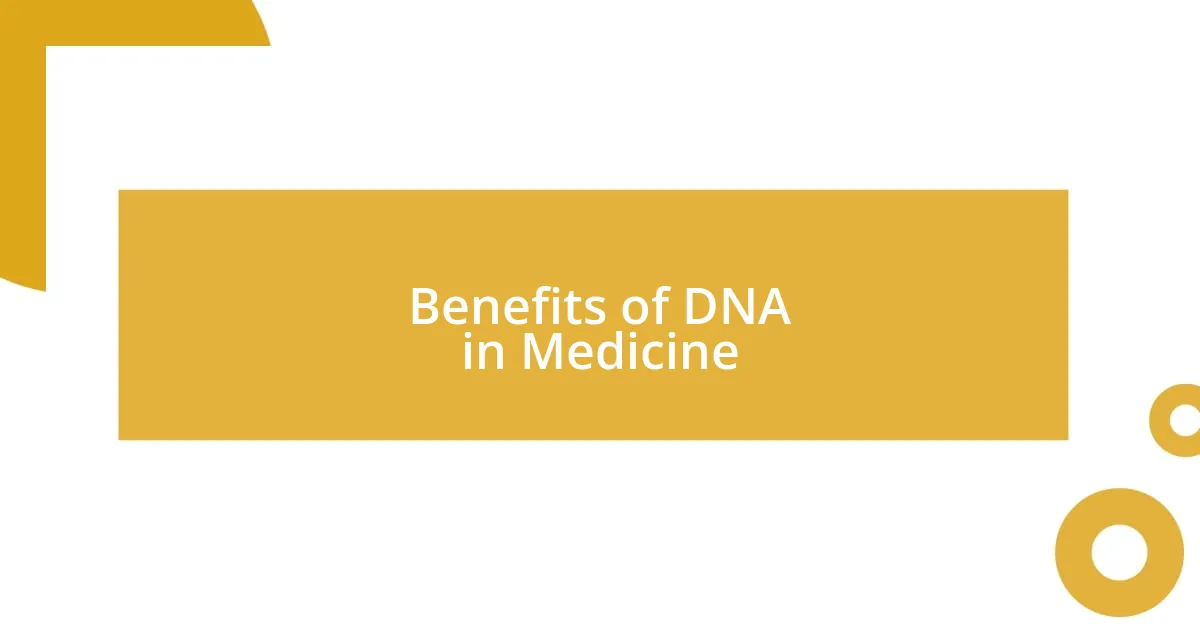
Benefits of DNA in Medicine
DNA’s role in medicine is nothing short of revolutionary. It enhances our understanding of diseases at the molecular level, enabling personalized treatment plans that cater to individual genetic profiles. Reflecting on my own experiences, I vividly remember receiving a genetic test result that revealed an increased risk for a certain condition. Instead of feeling anxious, I was empowered to take proactive steps in managing my health, highlighting just how transformative genetic information can be in clinical settings.
Here are some key benefits of DNA in medicine:
- Precision Medicine: Treatments tailored to an individual’s genetic makeup lead to more effective outcomes.
- Disease Prevention: Early identification of genetic risks allows for better preventive measures and lifestyle adjustments.
- Targeted Therapies: DNA insights can steer the development of therapies aimed at specific genetic abnormalities, improving treatment success rates.
- Understanding Rare Diseases: Genetic analysis can sometimes reveal the cause of rare conditions, aiding in diagnosis and management.
- Family Health Insights: This knowledge informs not just individual health, but also that of family members who may share genetic risks.
The depth of DNA’s contribution to medicine excites me. Each new discovery feels like uncovering a new layer of understanding concerning how our bodies function. I recently met someone whose illness was accurately diagnosed after a specific genetic test matched their symptoms with a rare disorder. It filled me with hope to see how knowledge of DNA can literally change lives, bringing clarity in what seemed like a murky and confusing health journey. This illustrates not just the utility of DNA but also the profound emotional impact it can have on individuals and families navigating health challenges.
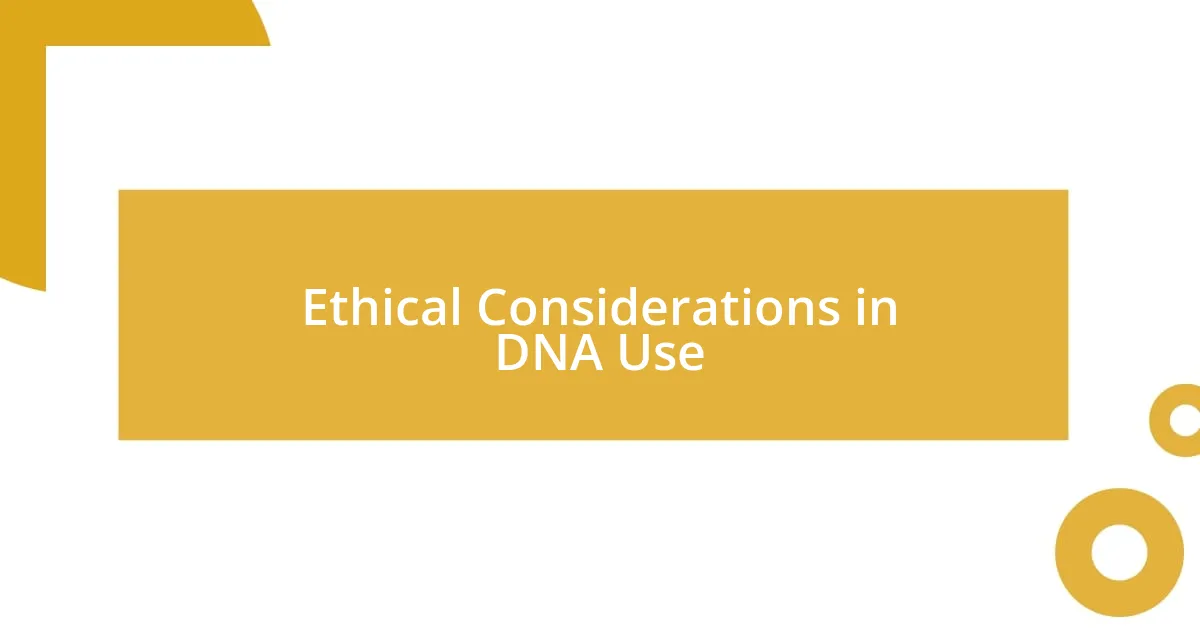
Ethical Considerations in DNA Use
When we delve into the ethical dimensions of DNA use, it’s impossible to overlook the potential for misuse. I remember a discussion I had with a friend about genetic discrimination—an unsettling concept where employers or insurance companies might exploit DNA information. Imagine the anxiety of knowing that a simple test could lead to biased decisions impacting your career or health insurance rates. Does knowing about our genetic predispositions become a double-edged sword, offering insights while leaving us vulnerable?
Another vital consideration is informed consent. For instance, when I participated in a genetic study, I was struck by the extensive forms they required me to sign. Were they clearly explaining how my DNA data would be stored and used in the future? This experience made me think: how often do individuals truly understand what they are consenting to when it comes to their genetic information? The gap between our excitement for genetic advancements and the need for transparency can create significant ethical dilemmas.
Furthermore, there’s the complex question of genetic privacy. Reflecting on my experiences, I felt an unsettling blend of empowerment and vulnerability when I shared my genetic information. Privacy concerns are not just about data; they go deeper into our identities and how we perceive ourselves in society. If our DNA could be used to craft a profile of who we are, where does that leave our sense of autonomy? Each of these ethical considerations invites us to ponder how we navigate this cutting-edge landscape of DNA technologies while safeguarding our rights as individuals.
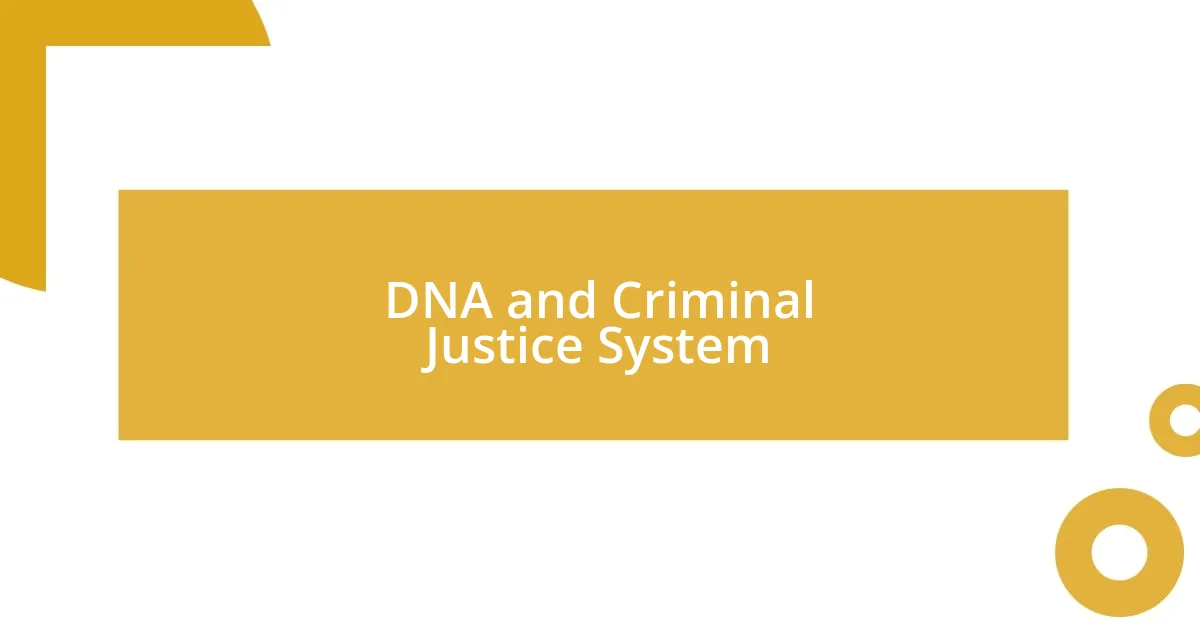
DNA and Criminal Justice System
The integration of DNA evidence in the criminal justice system has dramatically shifted how we approach law enforcement. I recall hearing about a case where DNA evidence not only exonerated an innocent person but also led to the conviction of the actual perpetrator years after the crime occurred. It left me contemplating how DNA analysis can serve as a powerful tool for truth, yet it also raises questions: can we truly trust that every test will be executed flawlessly?
One aspect that often strikes me is the emotional weight of DNA in criminal cases. I’ve seen documentaries featuring families searching for closure after a loved one’s unsolved murder; discovering a match through DNA analysis finally gives them a glimmer of hope. However, this precision cannot overshadow the very real hurried judgments made when DNA appears as irrefutable evidence. Who decides the validity of that evidence? This aspect makes me think of the human stories intertwined with these tests—every DNA sample has a story, a life behind it.
On a personal level, witnessing discussions around DNA databases makes me uneasy yet fascinated. These extensive databases have the potential to solve cold cases, but I often wonder about privacy. Are we willing to sacrifice our personal information for the sake of safety? Reflecting back, I remember a time I considered doing a DNA test for ancestry purposes, only to hesitate at the thought of my genetic information being stored in a database. This internal conflict captures the heart of the debate surrounding DNA and criminal justice: a battle between the quest for justice and the right to privacy.
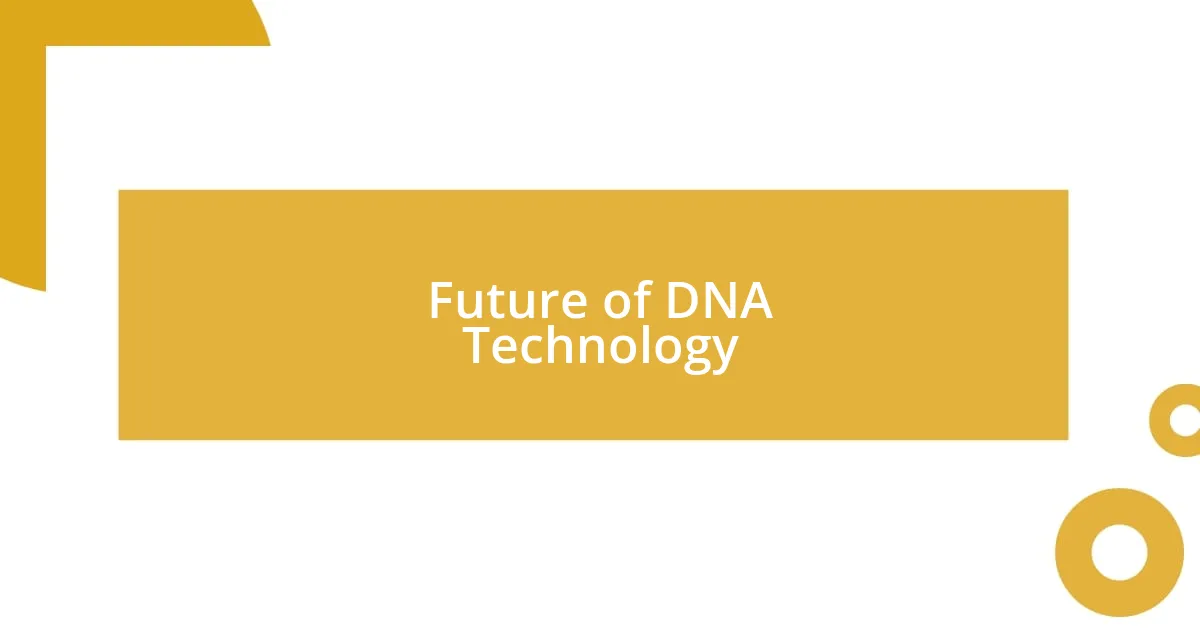
Future of DNA Technology
The future of DNA technology holds incredible possibilities that can shape our lives in ways we can’t fully grasp yet. Imagine a world where personalized medicine becomes the norm; doctors could tailor treatments based on our genetic makeup. I often think about how my future health decisions might look if my medical team understood my DNA intricacies. Would I feel more secure, knowing that my treatment plan was uniquely designed just for me?
As I consider advancements like CRISPR gene editing, I feel a mix of awe and apprehension. This technology could eradicate genetic diseases, yet the idea of editing our DNA raises delicate questions about the implications of “playing God.” How far should we go with engineering our own biology? For me, this balance between innovation and ethical responsibility is something we will have to navigate carefully.
Looking ahead, the expansion of DNA data in areas like ancestry testing can transform personal identity exploration. I remember when I learned about a friend’s experience with a DNA test that connected her to relatives she never knew existed. It was a profound moment, but it also made me wonder how such revelations could reshape families and relationships. As we embrace the future of DNA technology, we must consider how these advancements not only inform us about our biological roots but also impact our emotional landscapes and social connections.
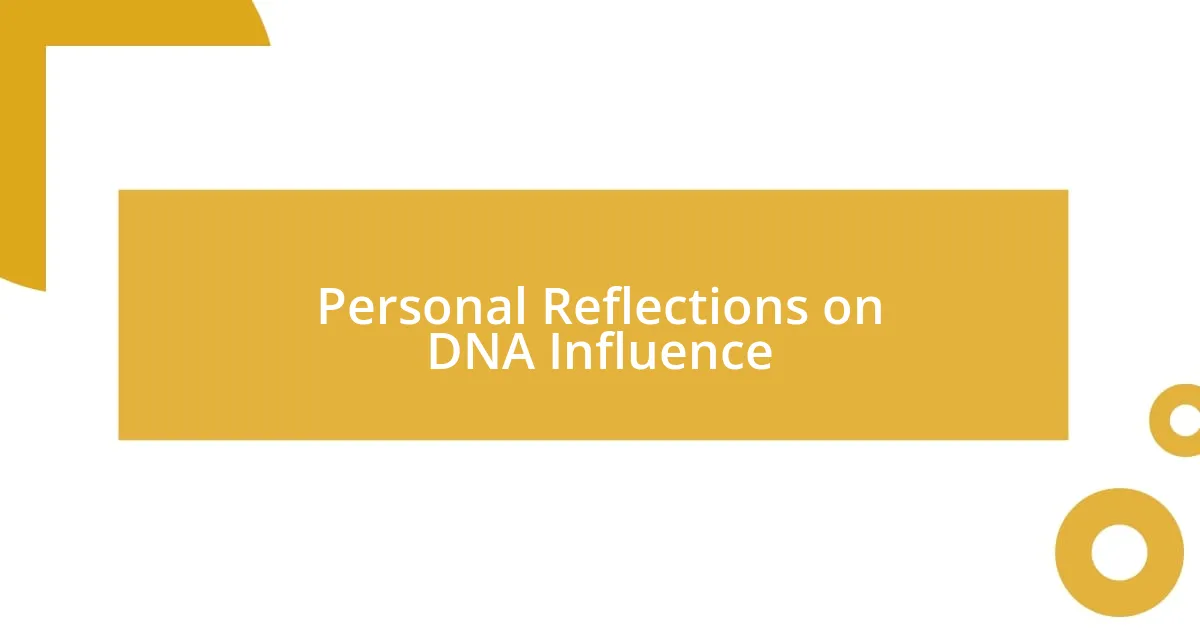
Personal Reflections on DNA Influence
Reflecting on DNA’s influence in society, I often find myself thinking about the layered implications it brings to our lives, especially in health and technology. I remember sitting in a café with a friend who shared her recent experience of discovering a rare genetic condition through DNA testing. As she recounted the moment, it struck me how DNA doesn’t just reveal our biological makeup; it also shapes our health journeys and personal narratives. The knowledge this test provided her was eye-opening but also daunting; how do you navigate a health landscape that suddenly feels more fragile?
The ethical dimensions surrounding DNA profiling also stick with me. For instance, I used to marvel at how DNA can unravel mysteries of ancestry and heritage—but now, I can’t shake the feeling of uncertainty that accompanies this wonder. When I consider the rise of commercial DNA tests, I ask myself: is it right for companies to hold such intimate pieces of our identity? This tension between curiosity and caution resonates deeply with me, as it reflects a broader societal dilemma about how much we are willing to share in pursuit of knowledge.
Moreover, my thoughts often drift to the emotional repercussions that DNA technology can have on personal relationships. I have a close relative who connected with a half-sibling via a DNA testing service, leading to joy intertwined with bittersweet feelings of lost time. This made me reflect: when we uncover our past through genetic connections, what future dynamics shift as a result? The blend of excitement and apprehension surrounding DNA discoveries reminds me that while this technology has the power to enlighten, it also carries the weight of complexity on human connections and identities.










